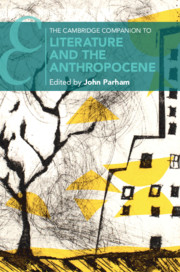Book contents
- The Cambridge Companion to Literature and the Anthropocene
- The Cambridge Companion to Literature and the Anthropocene
- Copyright page
- Contents
- Figures
- Contributors
- Acknowledgements
- Chronology
- Introduction
- Prologue Earth, Anthropocene, Literary Form
- Part I Anthropocene Forms
- Part II Anthropocene Themes
- Chapter 10 Catastrophe
- Chapter 11 Animals
- Chapter 12 Humans
- Chapter 13 Fossil Fuel
- Chapter 14 Warming
- Chapter 15 Ethics
- Chapter 16 Interspecies
- Chapter 17 Deep Time Visible
- Further Reading
- Index
- Cambridge Companions To …
Chapter 14 - Warming
from Part II - Anthropocene Themes
Published online by Cambridge University Press: 28 July 2021
- The Cambridge Companion to Literature and the Anthropocene
- The Cambridge Companion to Literature and the Anthropocene
- Copyright page
- Contents
- Figures
- Contributors
- Acknowledgements
- Chronology
- Introduction
- Prologue Earth, Anthropocene, Literary Form
- Part I Anthropocene Forms
- Part II Anthropocene Themes
- Chapter 10 Catastrophe
- Chapter 11 Animals
- Chapter 12 Humans
- Chapter 13 Fossil Fuel
- Chapter 14 Warming
- Chapter 15 Ethics
- Chapter 16 Interspecies
- Chapter 17 Deep Time Visible
- Further Reading
- Index
- Cambridge Companions To …
Summary
Arguing that literature requires alternatives to genres such as cli-fi – that focus on the ‘after’, the catastrophe, rather than causes or solutions – this chapter examines Palestinian literature. It draws on Ghassan Kanafani’s novella Men in the Sun (1962) to narrate a tradition of writing that has emerged from interconnected processes of resource extraction, colonialism and fossil capital; and, historically, from the nakba (‘catastrophe’) – the displacement or ethnic cleansing of 70,000 Palestinians in 1948 – and enforced migration to, for example, an unbearably hot Iraq. He notes that a twentieth-century literary tradition – of poets (Jabra Ibrahim Jabra, Marwan Darwish) and novelists (Susan Abulhawa, Liyana Badr) – both recalls a fecund Palestine, pre-oil, and resists the forces and interests of the fossil economy. With the experience of displacement and environmental devastation increasingly globalised, the enduring resistance that characterises Palestinian literature can be an exemplar for literature not as resignation but as resistance to the accelerating, imperialising forces underlying the Capitalocene.
- Type
- Chapter
- Information
- The Cambridge Companion to Literature and the Anthropocene , pp. 242 - 257Publisher: Cambridge University PressPrint publication year: 2021

